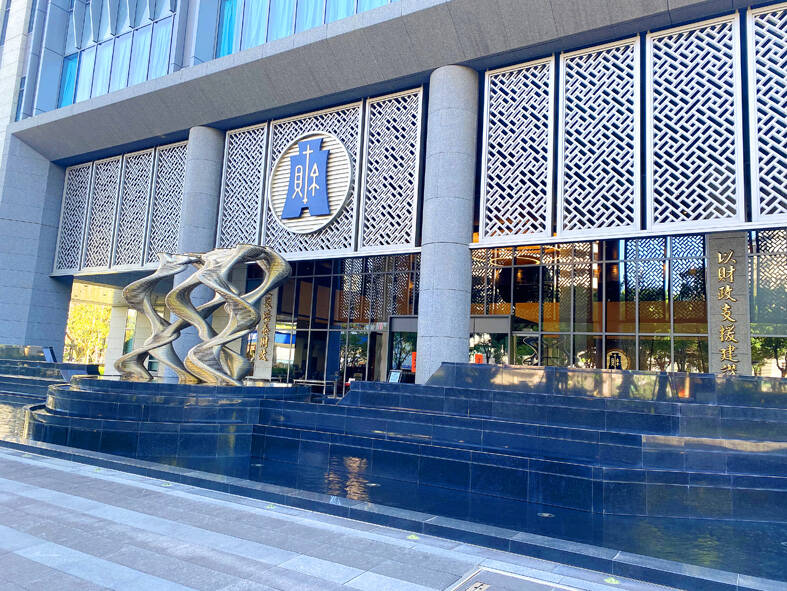Tax revenue last month increased 11.5 percent from a year earlier to NT$216.5 billion (US$6.67 billion), supported by delayed corporate income tax filing, as well as increases in securities transaction and business taxes, the Ministry of Finance said yesterday.
Corporate income tax revenue spiked 29.5 percent year-on-year to NT$10.4 billion, as bad weather late last month led some companies to postpone filing their taxes, the ministry said.
WEAK MANUFACTURING

Photo: Clare Cheng, Taipei Times
In the first seven months of the year, revenue from corporate income tax shrank 16.3 percent to NT$128.5 billion, as most manufacturing sectors continued to take a hit from weak demand amid a global economic slowdown, it said.
Personal income tax revenue grew 7.3 percent to NT$8.4 billion, as revenue from house sales offset the decline in revenue from personal income, the ministry said.
Likewise, personal income tax revenue picked up 11.2 percent to NT$589 billion in the first seven months, as a sizable number of people reaped a windfall from a housing boom and paid more income taxes linked to property deals, it said.
Tax revenue from securities transactions last month soared 41.1 percent annually to NT$31.5 billion, thanks to a hefty 27.4 percent advance in the average daily turnover to NT$585 billion, the ministry said.
The upswing came as foreign institutional players and proprietary traders dumped tech shares in the second half of last month, while mutual funds raised stakes, it said.
HOME BUYING
Tax revenue from land value gains rose 17.8 percent to NT$8.1 billion last month, as the home-buying zeal remained unabated and housing deals in the six special municipalities increased 11.6 percent last month from a year earlier, the ministry said.
As of last month, cumulative tax revenue totaled NT$2.35 trillion, representing a 2.8 percent increase from the same period last year and staying ahead of the government’s budget schedule by 9.6 percent, it said.

Taiwan Semiconductor Manufacturing Co (TSMC, 台積電) last week recorded an increase in the number of shareholders to the highest in almost eight months, despite its share price falling 3.38 percent from the previous week, Taiwan Stock Exchange data released on Saturday showed. As of Friday, TSMC had 1.88 million shareholders, the most since the week of April 25 and an increase of 31,870 from the previous week, the data showed. The number of shareholders jumped despite a drop of NT$50 (US$1.59), or 3.38 percent, in TSMC’s share price from a week earlier to NT$1,430, as investors took profits from their earlier gains

In a high-security Shenzhen laboratory, Chinese scientists have built what Washington has spent years trying to prevent: a prototype of a machine capable of producing the cutting-edge semiconductor chips that power artificial intelligence (AI), smartphones and weapons central to Western military dominance, Reuters has learned. Completed early this year and undergoing testing, the prototype fills nearly an entire factory floor. It was built by a team of former engineers from Dutch semiconductor giant ASML who reverse-engineered the company’s extreme ultraviolet lithography (EUV) machines, according to two people with knowledge of the project. EUV machines sit at the heart of a technological Cold

Taiwan’s long-term economic competitiveness will hinge not only on national champions like Taiwan Semiconductor Manufacturing Co. (TSMC, 台積電) but also on the widespread adoption of artificial intelligence (AI) and other emerging technologies, a US-based scholar has said. At a lecture in Taipei on Tuesday, Jeffrey Ding, assistant professor of political science at the George Washington University and author of "Technology and the Rise of Great Powers," argued that historical experience shows that general-purpose technologies (GPTs) — such as electricity, computers and now AI — shape long-term economic advantages through their diffusion across the broader economy. "What really matters is not who pioneers

TAIWAN VALUE CHAIN: Foxtron is to fully own Luxgen following the transaction and it plans to launch a new electric model, the Foxtron Bria, in Taiwan next year Yulon Motor Co (裕隆汽車) yesterday said that its board of directors approved the disposal of its electric vehicle (EV) unit, Luxgen Motor Co (納智捷汽車), to Foxtron Vehicle Technologies Co (鴻華先進) for NT$787.6 million (US$24.98 million). Foxtron, a half-half joint venture between Yulon affiliate Hua-Chuang Automobile Information Technical Center Co (華創車電) and Hon Hai Precision Industry Co (鴻海精密), expects to wrap up the deal in the first quarter of next year. Foxtron would fully own Luxgen following the transaction, including five car distributing companies, outlets and all employees. The deal is subject to the approval of the Fair Trade Commission, Foxtron said. “Foxtron will be